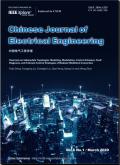Research on Distributed Coordination Control Method for Microgrid System Based on Finite-Time Event-Triggered Consensus Algorithm
IF 3.5
Q1 Engineering
引用次数: 0
Abstract
Microgrids are networked control systems with multiple distributed generators (DGs). Microgrids are associated with many problems, such as communication delays, high sampling rates, and frequent controller updates, which make it challenging to realize coordination control among the DGs. Therefore, finite-time consensus algorithms and event-triggered control methods are combined to propose a distributed coordination control method for microgrid systems. The DG in the microgrid system serves as an agent node in the control network, and a distributed secondary controller is designed using finite-time consensus algorithm, such that the frequency and voltage restoration control has a faster convergence time and better anti-interference performance. The event-triggered function was designed based on the state information of the agents. The controller exchanges the state information at the trigger instants. System stability is analyzed using the Lyapunov stability theory, and it is verified that the controller cannot exhibit the Zeno phenomenon in the event-triggered process. A simulation platform was developed in Matlab/Simulink to verify that the proposed control method can effectively reduce the frequency of controller updates during communication delays and the burden on the communication network.基于有限时间事件触发共识算法的微电网系统分布式协调控制方法研究
微电网是由多个分布式发电机(DG)组成的联网控制系统。微电网存在许多问题,如通信延迟、采样率高、控制器更新频繁等,这使得实现 DG 之间的协调控制具有挑战性。因此,有限时间共识算法与事件触发控制方法相结合,提出了一种微电网系统分布式协调控制方法。微电网系统中的 DG 作为控制网络中的代理节点,利用有限时间共识算法设计分布式二级控制器,使频率和电压恢复控制具有更快的收敛时间和更好的抗干扰性能。事件触发功能是根据代理的状态信息设计的。控制器在触发时刻交换状态信息。利用 Lyapunov 稳定性理论分析了系统稳定性,并验证了控制器在事件触发过程中不会出现 Zeno 现象。在 Matlab/Simulink 中开发了一个仿真平台,以验证所提出的控制方法能有效降低通信延迟时控制器更新的频率,减轻通信网络的负担。
本文章由计算机程序翻译,如有差异,请以英文原文为准。
求助全文
约1分钟内获得全文
求助全文
来源期刊

Chinese Journal of Electrical Engineering
Energy-Energy Engineering and Power Technology
CiteScore
7.80
自引率
0.00%
发文量
621
审稿时长
12 weeks
 求助内容:
求助内容: 应助结果提醒方式:
应助结果提醒方式:


